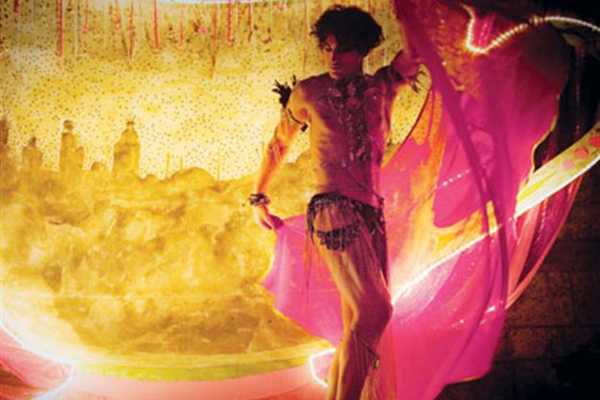'Zenne Dancer' stirs controversy on taboo subject
EMRAH GÜLER ISTANBUL- Hürriyet Daily News


‘Zenne,’ named after the men who dress in women’s clothing for a type of Turkish theater, is based on the true story of a young gay man who was allegedly gunned down by his father in July 2008 after coming out. Company photo
Still two months away from its release date, the award-winning feature ‘Zenne’ (Zenne Dancer) has already managed to stir controversy. The film has scared off one film festival, but another will screen it.
The award-winning Turkish feature “Zenne” (Zenne Dancer) will hit screens in mid-January. For the handful of people that have seen advanced screenings of the movie, however, it is already promising to be yet another litmus test of mainstream Turkish attitudes toward a prominent taboo: homosexuality.
The film’s controversial nature arises from its blunt tackling of homosexuality in its relation to traditions, family, state and the military. Co-directed by M. Caner Alper and Mehmet Binay, the film won five Golden Oranges at the recent Golden Orange Film Festival, Turkey’s most prestigious film event. “Zenne” took home the Best Film Award, the Turkish Cinema Critics Guild’s Best Debut Feature Award, as well as honors for cinematography and best supporting actor and actress.
“Zenne” is based on the true story of Ahmet Yıldız, a young gay man who was allegedly gunned down by his father in July 2008 after coming out. Ahmet’s father has yet to be tried for the alleged murder.
Named after the men who dress in women’s clothing for a type of Turkish theater, the film sets its story around the friendship of three men, including Ahmet, who is from a conservative family from eastern Turkey. Can is the opposite of Ahmet in many respects. He’s a flamboyant belly dancer, an openly gay man loved, supported and protected by his family. Daniel, a German photojournalist who has been in Istanbul for a short time, is the distant figure who helps frame the contradictory nature of Turkey’s look at homosexuality.
“Zenne” aims straight at the heart of patriarchy coming in all shapes and sizes, from state-induced laws, to the treatment of gay men in the military and to hate crimes. The film comes with a twist on the prevailing honor killings that have taken and continue to take the lives of many women.
The twist is why “Zenne’s” Golden Orange success and its erstwhile inclusion in a film festival in eastern Turkey mean something a whole lot more. The Malatya International Film Festival had invited “Zenne” to be one of the eight films to be included in its national competition.
Last week, however, co-directors Alper and Binay issued a press release saying the festival had informed them that they had until Nov. 18 to submit a certain operating permit from the Culture and Tourism Ministry, a document that is not required for films screened in festivals. The bitter tone of the statement was clear from the headline: “Are disguised obstacles being placed in front of ‘Zenne’?”
Social media and traditional media went on fire for nine days, condemning the blatant attempts at censorship under the guise of bureaucracy. And who could fight the great challenge that is bureaucracy?
On Nov. 18, in another statement, the co-directors announced that “as expected,” the film would not be running in the national competition in this year’s Malatya International Film Festival. The statement continued, “All along, the aim of the team behind ‘Zenne’ has been to reach as many people as possible with the subject matter of the film and keep the problem [front and center]. ‘Zenne’ will continue to serve its purpose in other national and international festivals it is invited to.”
In a twist of fate, “Zenne” was screened one day before the opening of the Malatya Film Festival at the opening film of another national festival, the Pink Life Queerfest, Turkey’s first international Lesbian, Gay, Bisexual and Transgender film festival held in Ankara. The festival, by its very nature, accepted “Zenne” with open arms.
With the motto, “There is a place for all of us under the rainbow,” the Pink Life Queerfest will run until Nov. 24 and screen around 50 films from 15 countries. The Under the Rainbow section will feature eight award-winning films, including Spanish director Roberto Caston’s “Ander,” Lebanese actor-director Amor Hakkar’s “A Few Days of Respite” and German auteur Tom Tykwer’s “3.” For more information on the festival, check festival.pembehayat.org
